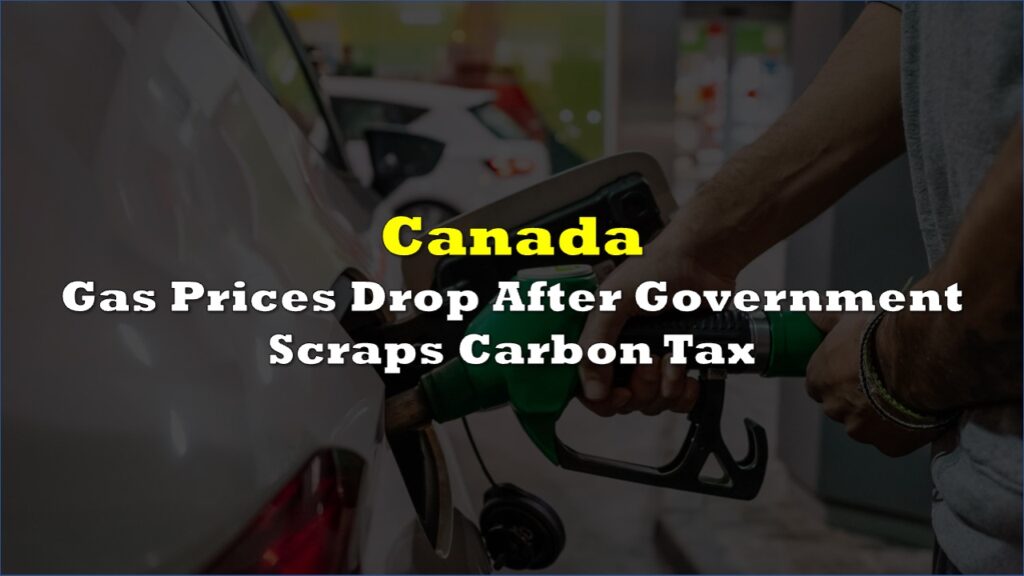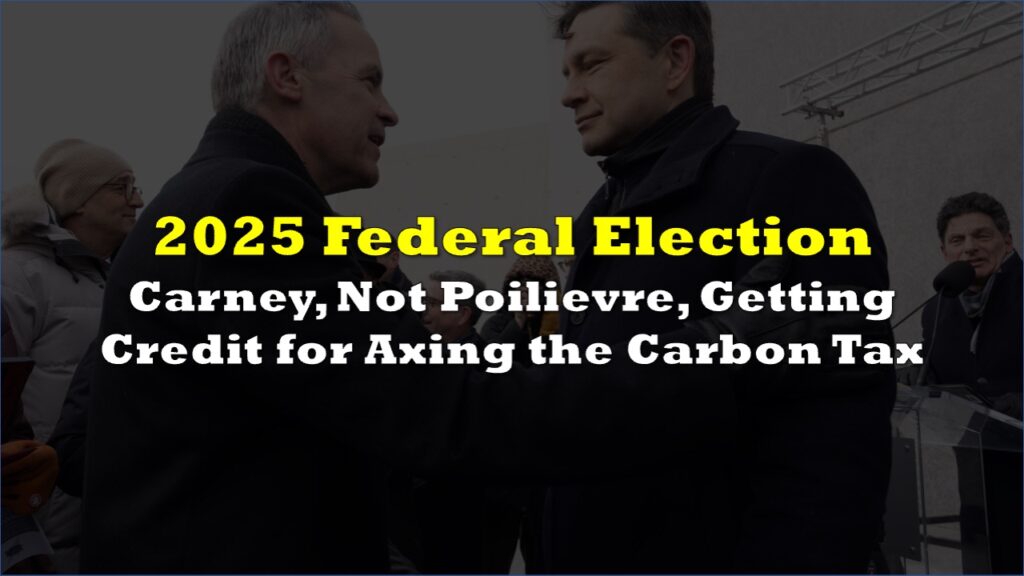The latest report from Canada’s Parliamentary Budget Officer (PBO) delivers a brutal reality check for anyone still buying into the Trudeau government’s carbon tax scheme. Behind the Liberal government’s rhetoric of environmental responsibility lies a harsh truth: the carbon tax is a financial wrecking ball, leaving the average Canadian household facing significant economic losses by 2030-31.
The PBO’s findings are crystal clear: by 2030-31, the vast majority of Canadians will see a net cost from the carbon tax. Households will be hit from all sides—paying more in the federal fuel charge, swallowing higher goods and services taxes (GST), and watching their incomes shrink as the carbon tax drags down investment and employment.
The report projects that the average household across every backstop province (excluding Quebec and British Columbia) will be worse off. The carbon tax, which the government insists is offset by the Canada Carbon Rebate, actually leaves families with net losses once the broader economic impacts are factored in. These impacts include reduced employment opportunities and declining wages across key sectors, particularly in provinces like Saskatchewan and Alberta.
For instance, by 2030-31, households in Saskatchewan will face some of the hardest hits. The carbon tax will slash capital income by 3.3% in the province, devastating sectors like agriculture and energy that are the lifeblood of its economy.
Even Alberta, the economic engine of Canada’s energy industry, is set to see real GDP fall by 0.6% due to the carbon tax, further eroding household incomes. For Canadian families, this means less money to cover rising costs, and fewer opportunities for stable employment in industries the carbon tax directly undermines.

$4 billion annual deficit
While the government boasts about rebates and environmental benefits, the PBO’s report lays bare the long-term economic damage. Canada’s GDP is set to drop by 0.6% in provinces like Ontario and Alberta, while labor and capital incomes across the country nosedive under the weight of the carbon tax.
Saskatchewan, again, emerges as one of the biggest losers under this policy. The PBO estimates that the province will see household incomes from labor and capital shrink, leaving residents grappling with economic decline. The carbon tax will lead to job losses, decreased wages, and weakened investment—gutting the province’s agricultural and industrial sectors.
This is all part of the broader picture: the PBO projects that by 2030-31, the federal fuel charge will increase Canada’s budget deficit by $4 billion a year. That’s $4 billion sucked out of an economy already under strain, with little to show for it other than higher taxes and fewer jobs.
Minister of the Environment and Climate Change Steven Guilbeault, however, continues to push the narrative that the carbon tax is a necessary tool in the fight against climate change. Guilbeault claimed the PBO report supports the government’s position, dismissing the Conservative Party’s criticisms as misleading.
According to him, “the vast majority of Canadians get back more through the Canada Carbon Rebate than they pay.”
Read my statement in response to todays PBO report : pic.twitter.com/g67OUbKLVu
— Steven Guilbeault (@s_guilbeault) October 10, 2024
But Guilbeault’s reassurances ignore the economic costs laid out in the PBO’s report. Even if lower-income households see small short-term gains from the rebates, the overall economic impacts—particularly for middle- and upper-income Canadians—are catastrophic. The carbon tax is strangling sectors that drive Canadian wealth and employment, and no amount of rebate checks can fix the long-term damage to the country’s economy.
The Liberals also conveniently omit that the PBO report doesn’t account for the long-term costs of climate change itself. While the government touts emission reductions as a justification for the policy, the PBO notes that these benefits remain unmeasured in economic terms. What’s left is a tax that costs billions, deepens the deficit, and leaves Canadians poorer, without clearly defined environmental payoffs.
As Canadians brace for the continued rise of the carbon tax, the PBO’s report serves as a grim warning. By 2030-31, households across the country will face steep economic losses, with reduced income, higher costs, and fewer opportunities. The government’s carbon tax, far from being a progressive tool to fight climate change, is shaping up to be one of the most economically damaging policies in recent memory.
Of course you skipped the damning parts. pic.twitter.com/kJbcUVKPoe
— MBrant75 (@MBrant75) October 10, 2024
Um Max you left out a page, oh and you also forgot to mention the extra 4 billion it will add to the deficit by 2030. pic.twitter.com/tsuZjpdHFk
— Jeff (@JcookeJeff) October 10, 2024
The Trudeau government is asking Canadians to sacrifice their livelihoods for a tax that doesn’t just hurt the wealthy—it hits everyone. Whether through job losses, decreased investment, or a ballooning deficit, the carbon tax’s destructive reach will be felt across the nation. And with no clear answers from the government on how this economic collapse will be mitigated, Canadians are left wondering: how much more will they be forced to pay for this failing policy?
Information for this story was found via the sources and companies mentioned. The author has no securities or affiliations related to the organizations discussed. Not a recommendation to buy or sell. Always do additional research and consult a professional before purchasing a security. The author holds no licenses.










One Response
It is well known that Carnehs wife is on the gravy train of the enviroment just as his companies are. So this is a real conflict likely driven by Carney vis JT seeking to match the damages his father created. I fot years used my vote but not for the big 3 parties as I believed they failed Canada on every front Federally and provincially. I cant believe that this election managed by the Libs ro extend our voting day supported by the NDP are still trying to drive this enviroment myth. Speak to the world scientist or at least those not involved will actually suplort the audit findings. The WEF. look at their web site..wow they want control. Then ask the real question where has all the carbon tax money gone to? Then every car owner do as I did. How much have your gasoline costs dropped per tank refill and add all that to a year of outgoing plus the HST and whatever other tax there is. You will be shocked at the rip off of all countries. Of course most countries can’t afford the percentage set by the crazies.. Then the current leader of the Liberals. An unknown with a fixation. A behind the scene man who hasvmade millions with oil ( Saudi Brazil etc) and green energy (his baby and millions already made together with Liberal investors). Companies bent on destruction of the west because China India etc will not follow this taxation. Even the US are smarter.
Carney lies as we have seen or at least uses an untrue narrative.. Bank of UK Why are they warning Canada? Then the financial crisis but Mr Harper covered that stretch of the lies. Carney had nothing to do with protecting Canada. Then his change in tactics. The firstcfew weeks ofvthe campaign.. only about the enviroment..his baby and goal plus claim to fame if he succeds just as JT hoped ( like Daddy!!). Then the Liberal narrative started to change. Gradual drop of enviroment and then the lifting of thecarbon tax from the pumps.. but this is only till the election is over. If Carney wins our lives here will change not for the better. Still states the same crap as JT. History of the last 9 years show the failure of this party. So many broken promises and trusts. Taxation housing immigration lack of control of government spending oh yes the 130M slush fund. Yet another 4o m was it released to the Libs without any consultation as the government was closed by Trudeau.. What a plan. JT MC and the Libs planning the take over of our country under false pretences I fear. Platform PP was straight forward whether you like it or not.. no flopping about.. Platform JT/MC nothing except the enviroment and over the weeks have started following the PCs to a degree but we have never seen JT deliver on his promises to Canadians. Why? Will the Liberals be like our brethern to our south?? Finally the ” Tarrifs”.. well we can only deal as they come or not but they will damage ” the owner”.Our election should be truly focused on Canada and its people. Being a CEO and able to dodge taes by banking off shore shows a good knowledge to look after self for sure and a company that did move to the US at a strange time.. But like PP and MC neither have run a country of millions of people. A country that requires honest strong ethical leaders who will support the recovery of our country. MC has millions salted away but fails to declare financials why not? How many conflict of Interests are there jncluding the trust..remember he is a banker and knows all the tricks to hide money. His wife works for another company thst has 400 goverment contracts.. what are those details? When were they signed ? Dated are very critical just as resignation dates are. So how many contracts were approved while MC was senior advisor to JT?
If we need to use our northern resources then it shouldvbe the decision of the people of Canada, not a few old goats who are greedy and want dominence of Canada. Our northern citizens must have their say as they will also be impact just as the rest of Canada. It is worth using the slush fund to start assessing the future of Canada. Do we use some of our undeveloped wealth to help our country? Check other countries and see their success. Imagine having a well served country by great leaders who put Canadians first. Secured borders supported by a strong Canadian military. A leader not named by China and who borrowed a large sum from China..Why so quiet? Secret trips / meetings.
Why run to europe on day 2 as PM but Canadians came after that so important trip to France and UK. Just so interesting the terminology used, vast contacts ” used” meant to indicate power yet no invite to?? But JT scurried that friday as fast as he could.. no wonder he was referred to as the 51st gov… I do not think the average voter is easily fooled by people who lie and are not really going to create a better Canada. So this coming election is the most important vote for Canada as it will set the course for our near and far future… it is not the way of the world to cheat, lie, steal, disregard laws…or try to fool a population.. that is not the Canadian way. If this is how we have become then we deserve the dark future ahead with equally dark and uncaring leadership. The start of the slippery slope… are we there ?? Personally my vote will be the best choice I can make and who do I trust to lead this country… or maybe just do no damage and go for the smaller parties who do no harm.